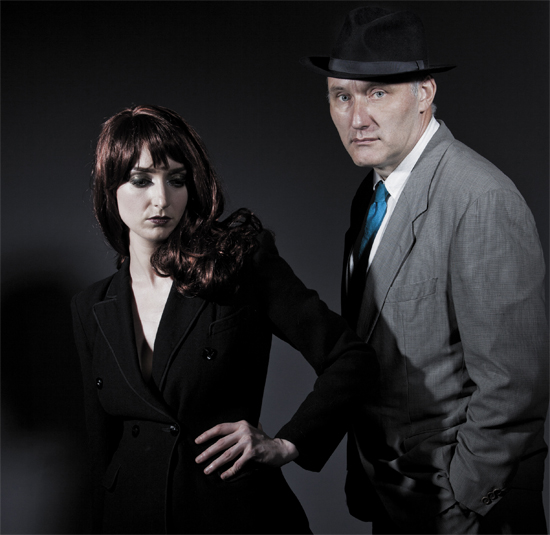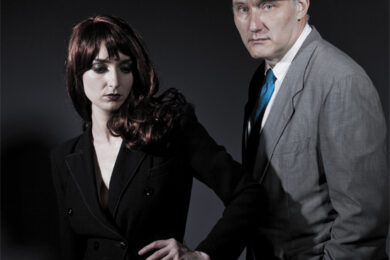Jah Wobble and Julie Campbell (aka Warp’s purveyor of spooked pop Lonelady) have teamed up to record a collaborative album, Psychic Life, due for release in November. After meeting in February this year, the pair hit it off and began recording together, with Wobble listing his influences as including Georgio Moroder, J.G.Ballard, Karl Lagerfeld, French film noir and disco.
There’s no direct word as to what Psychic Life will actually sound like, but given the above list and Campbell’s solo music, the pair seem pretty well matched. Lonelady’s Nerve Up album dealt in stripped down, sparse arrangements with a debt to recently reformed post-punk pioneers – and Wobble’s old band – Public Image Ltd. So it makes even more sense that PiL guitarist Keith Levene also features on the record.
Ahead of the album’s release, Wobble has written a short essay describing how he and Campbell first met and started working together.
After deciding not to play with the reformed PiL, he says, "that episode further whetted my appetite to make a post-punk album in the original PiL mode (but with a modern sensibility – there’s no point in making ‘museum music’). The thing that had always thwarted me was the distinct lack of a charismatic (in the right ‘uncharismatic’ way) singer/front person. I had been on the lookout for ‘the one’, on and off, for twenty odd years. To be honest, I had never even come close. However, not being able to find the right person has never baffled me. It is, after all, a tall order. They would need to be able to deal convincingly with a number of styles of music, whilst always being their own (authentic) idiosyncratic self. (Up to this point, I have never even seen the particular ‘ideal’ that I was looking for contained in any one performer.)"
Wobble also spends some time musing on the ethos and meaning behind post-punk in its original form, and how they apply to modern day life.
"Spoken word needs to be part of the package in a venture like this," he says. "For all its darkness and trauma, post-punk is connected (inextricably) to the ideals of late nineteenth century romanticism; especially its poetry, which rails, quite rightly, against the rationalisation of life and nature. Back then, the industrial age was the enemy, whereas now it’s the information-led age, the new Tower of Babble, in its myriad forms, that stands infantile and all-pervasive in opposition to the romantic ideal.
"Facebook and the industrial revolution point towards the same thing. Unthinking, unhappy uniformity – well, fuck that. (That’s why post-punk came about; because ‘punk’ became unthinking, unhappy and uniform – and artistically restricting.)
"So as I sat there, on a bright fresh early spring afternoon, I had one question on my mind: "is this the one?" The early indications were very positive. Julie was well up to give it a go. All I could promise, at that point, was that it was highly likely that the process would be a lot of fun and that nice dinners would be eaten in nice restaurants. She also told me that she was a serious PiL fan, which delighted me. That meant that we were halfway there already. I suggested that we get Keith Levene to play some guitar for us. Keith had been in contact with me in the months leading up to my meeting with Julie. In fact, I had already had a bash with him at the end of one of my gigs. I knew that he was very aware that he had wasted so many years pursuing the wrong things. It was a good time to be getting him in. We decided that we would cut some basic backing tracks, and if all went well, we would get Levene to play on them. No-one has ever come close to Levene in terms of playing the non-square, non-bourgeoisie, harmonically hip, ‘guitar wash’ a la ‘Poptones’, ‘Theme’, etc.
"So a few days later, just to get the ball rolling, we cut three basic rhythm tracks, ‘Psychic Life’, ‘Phantasms’ and ‘Ruinlust’. Julie put vocals down. I noticed her thick, bound notebook of lyrics. I asked if I could peruse them. I was astounded; there was page after page of typed (as in typed with a typewriter) lyrics. A torrent of dark, haunting and troubled images was conveyed by the words. It was momentarily overwhelming. "Game on!" I thought, "this girl’s the real thing. She’s a poet!"
"I also found that she could really sing. Additionally I discovered that, similar to myself, she was a psychogeographer and long distance urban pedestrian (facts crucial to the creation of this project).
"Above all, the post-punk period was about having fun and shedding shackles. That ethos is as strong as it ever was, as far as I’m concerned. It’s about working with a melange of influences, approaches and aesthetics."
Psychic Life is released on Cherry Records on 14th November.



